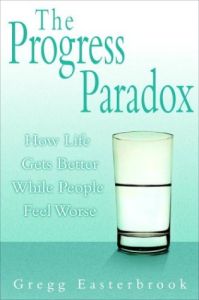Join getAbstract to access the summary!

Join getAbstract to access the summary!
Gregg Easterbrook
The Progress Paradox
How Life Gets Better While People Feel Worse
Random House, 2003
What's inside?
Money can't buy happiness. Neither can long life, health or status. Happiness is at hand: just be grateful and giving.
Recommendation
If you’ve ever felt discontent, read this book. If, like many people, you aspire to a higher standard of living, you may think that when you achieve that promotion, the big house, the money or even improved health - you’ll finally be happy. Yet happiness rarely comes. That’s because real happiness is never contingent - or even directly related to - possessions or achievements. Happiness is a choice. Despite all the choices people make daily, this is the one choice many do not make - or quite possibly do not know how to make. Ultimately, happiness is about feeling grateful for what you have and sharing your abundance with others. Author Gregg Easterbrook explains how and why this incredible paradox - that progress does not necessarily improve human happiness - is a problem for so many people today and why your best chance of achieving happiness resides in helping others. getAbstract is happy to recommend this book.
Summary
About the Author
Gregg Easterbrook has written six books, including A Moment on the Earth. He has worked as an editor or contributing editor for The New Republic, The Washington Monthly, Newsweek and The Atlantic Monthly.
















Comment on this summary